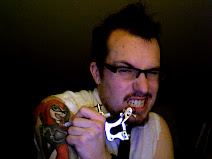If I asked you how many bombs you've seen diffused on film and television in your life time, I'm sure you wouldn't have an answer, it's incalculable. A better question would be to ask when the last time you genuinely felt like the result was in question, that you were less than certain that the bomb would be diffused and the hero walk away unscathed. I'm pretty sure that for me it was X-Files: Fight the Future, but that's because the guy who sat in front of the bomb in the pop machine had pretty much no intention of stopping the bomb whatsoever.
That principle is probably the key to figuring out the success of The Hurt Locker, a film that despite being about the biggest action movie cliche in history, is practically guaranteed a nomination for Best Picture at the Academy Awards and jockeying for the top spot on end of the year lists with the likes of Inglorious Basterds, Avatar, and Up in the Air.
I remember quite clearly the moment I first got excited about The Hurt Locker, back when it's trailer debuted over at Apple. It wasn't that they were trying to defuse bombs, or that they were doing it in Iraq. It was that shot of the dust and debris on the roof of a car being flung into the air from the shockwave of a blast. You can't describe the way that Kathryn Bigelow and her DP Barry Ackroyd capture an explosion, it's shockwave, and how they edit them together but it creates an intensely unique viewing experience. Not only does it bring you into much more intimate contact than anything since Blackhawk Down and perhaps even before that if ever, it creates- or at least for me- a bizarre ambivalence. Every time Sgt. James and his team got called out to an incident, I wanted them back behind the wire safely at the end of it, but at the same time I would think good goddamn, I want another one of those explosions.
Watching Jeremy Renner's cavalier Sgt. James at work and you'd have to think he'd agree with you and at times without the qualifier of making it back behind the wire in one piece. Sgt. James is routinely described by reviewers and even director Kathryn Bigelow as being addicted to combat, and when he first appears flouting all the procedure and protocol of his (very dead) predecessor the label seems all too accurate, but as the film progresses it seemed clear to me that he wasn't out there to push himself as close to death as he could or to feel a spike of adrenaline, but to find a purpose, to see life staring back at him in the face of death. He certainly doesn't see it in the cereal aisle at the grocery store back home.
While The Hurt Locker is an electrifyingly tense film that goes well beyond the specter of a hidden bomb to stop the audience's breath in nearly every scene, it feels entirely sordid and wrongheaded to use the kind of superlative nonsense usually reserved for spectacle driven farces like G.I. Joe that I've seen floated around. Certainly the tension and suspense in The Hurt Locker is equal to anything Inglorious Basterds or Paranormal Activity had to offer, but it's in service to something far more profound, recalling Kurosawa in it's deft touches (as does Inglorious Basterds, but that's beside the point).
Francis Ford Coppola famously claimed "Apocalypse Now isn't about Vietnam, it is Vietnam." Kathryn Bigelow lacks the hubris necessary for such a statement, but I'm comfortable in saying that in so far as a film could capture the experience- the nature of a particular conflict- The Hurt Locker does just that, and on a far more visceral, literal level than Coppola's masterpiece.
The Hurt Locker
Posted by
GonzoChaote
Sunday, January 10, 2010

0 comments:
Post a Comment